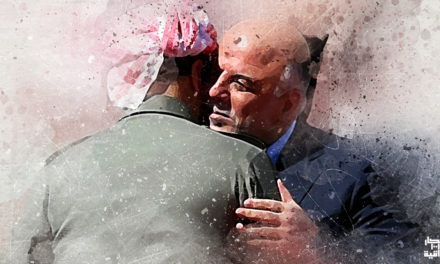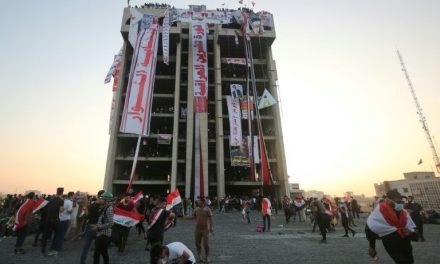Iraqi Prime Minister Haider al-Abadi issued a decree on Thursday to induct the Popular Mobilization Forces (PMF) into Iraq’s regular security forces. The PMF, also known as al-Hashd al-Sha’abi, will get the same rights and privileges as the country’s other armed forces. PMF members will receive similar salaries to the members of the military, including access to military institutes and colleges. They will also be subject to Iraqi military service laws and regulations.
Giving PMF members—who played a crucial role in fending off the Islamic State— the same rights as their brethren in regular forces will prove popular for Abadi, particularly amongst his own base, especially that the decree comes two months before the parliamentary elections.
At first glance, the decision might appear to be a mere reward to the PMF, or, if looked at with more skepticism, a nod to Abadi’s Shia base ahead of the election. But a closer look at the decree’s text will reveal that it goes much further than that. What Abadi has effectively done is re-establish the prime minister’s authority over decision-making within the PMF, limit its size, and challenge the influence of pro-Iran leaders, including the PMF’s deputy chairman and its effective leader, Abu Mahdi al-Muhandis, who is known for his longstanding ties with Iran.
One of the first things one might notice in the decree is that Abadi appointed a second deputy to the chairman of the PMF commission, thus diluting the influence of current deputy chairman, Abu Mahdi al-Muhandis. Muhandis has been at odds with PMF groups loyal to Grand Ayatollah Ali al-Sistani. Many of those groups privately accuse Muhandis of enlisting more members from pro-Iran groups such as his own Kata’ib Hezbollah and Kata’ib al-Imam Ali. It has been rumored Abadi’s decree was preceded by meeting he had with Maytham al-Zaydi, head of Firqat al-Abbas al-Qitalia, a pro-Sistani group. Zaydi allegedly pleaded with Abadi to curb Muahndis’ favoritism, and if the rumors are true, then Zaydi received the resolution he wanted.
The decree also outlines the powers of a deputy chairman by stipulating that the chairman of the PMF commission can delegate some of his powers to one or both of his deputies “in accordance with the laws,” as opposed to the current situation, where the deputy chairman —Muhandis— enjoys virtually the same powers as the chairman of the PMF commission.
Abadi also appears to be trying to overhaul the top positions in the PMF as well as limit the unnecessary growth of PMF membership. His decree sets age requirements and other conditions that would force 20% of the PMF members to retire. For example, fighters have to be between the age of 18 and 25 years old and must have at least an elementary degree. Another requirement set out by the decree, is that anyone with the rank of Formation Commander and above must be a graduate of the College of Command or the Defense Ministry’s staff college, and, only an exemption from the prime minister can waive that condition. This will forcibly retire many of the PMF commanders that hail from pro-Iran groups such as Badr and Kata’ib Hezbollah, who over time, have come to dominate the majority of administrative positions and the decision-making process in the PMF Commission.
Although the decree specified equal pay and benefits for PMF members as other military branches, it did not mention anything about equal armament for the PMF. The types of weapons the PMF will receive will remain vague, which gives Abadi the freedom to decide later.
With this decision, not only did Abadi score popularity points with Shi’i voters by ensuring that PMF fighters receive equal benefits, but he avoided potential attacks from PMF-linked parties who would have accused him of unjust treatment of the PMF and scolded him in the lead up to the election. Electoral calculations aside, having more checks on the PMF will ensure that it won’t be used in external conflicts, which will be good for Iraq and for the PMF in the long run.

Ihsan Noori
Ihsan Noori is a political writer and a contributor to Inside Iraqi Politics.










